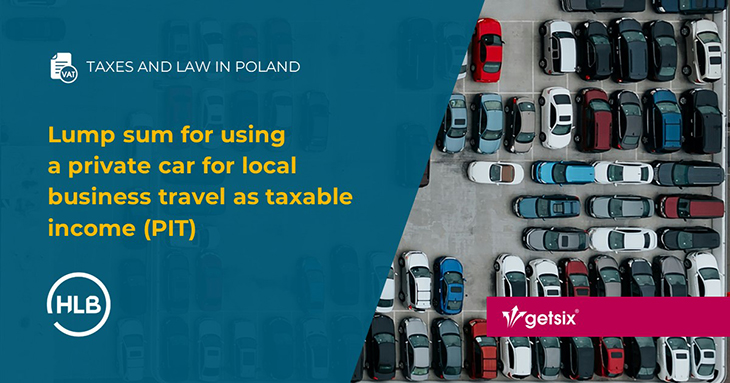Lump sum for using a private car for local business travel as taxable income (PIT)
In the Polish tax system, there are many categories of income subject to Personal Income Tax (PIT). One such income is the lump sum paid to an employee for using his private car for local business travel. This topic is controversial in both practice and doctrine. The ruling of the Supreme Administrative Court (SAC) on March 13, 2024 (case number II FSK 762/21) settles the tax nature of this benefit, though it is important to remember that in the past, the SAC issued rulings with different positions.
Legal Context
According to the Personal Income Tax Act (PIT Act), income from employment includes all monetary benefits and the value of benefits in kind or their equivalents, regardless of the source of their financing. Therefore, income includes both basic salary and various additional benefits related to employment, including lump sums for using a private car for business purposes.
Analysis of the SAC Ruling
In the ruling dated March 13, 2024 (case number II FSK 762/21), the Supreme Administrative Court addressed the issue of taxing the lump sum paid to employees for using their private cars for local business travel. The case involved an employee who regularly used his private vehicle for business duties, for which he received a fixed lump sum from his employer.
The SAC confirmed that this lump sum constitutes income from employment and is therefore subject to personal income tax. The court pointed out that the lump sum paid for using a private car for business purposes does not fall within the scope of exemptions specified in Article 21 of the PIT Act. The court’s argumentation was based on several key points:
- Nature of the Lump Sum: The SAC emphasized that the lump sum is a form of remuneration for providing a service, involving making a means of transport available to the employer. Therefore, it is a form of financial compensation for the employee for using his own property, directly increasing his wealth.
- Lack of Tax Exemption: The court noted that the PIT Act provides exemptions for certain categories of income, but the lump sum for using a private car for business purposes is not explicitly listed among these exemptions. Specifically, this benefit is not covered by the exemption specified in Article 21(1)(23a) of the PIT Act, because the employer’s obligation to pay does not directly arise from other laws. Consequently, there are no legal grounds to consider this benefit tax-free.
- Income from Employment: The SAC determined that the lump sum paid for using a private car for local business travel is closely related to employment. It is an additional benefit that the employee receives as part of his job duties and constitutes a financial benefit for him.
Consequences of the Ruling
The SAC ruling from March 13, 2024, has significant implications for both employees and employers. Primarily, it means that the lump sum paid for using a private car for local business travel must be included as income in the employee’s tax return. Employers are thus required to include this lump sum when calculating income tax advances on employee salaries.
Summary
The SAC ruling from March 13, 2024 (case number II FSK 762/21), is a crucial reference point regarding the taxation of the lump sum for using a private car for local business travel. The court unequivocally stated that this benefit constitutes income from employment and is subject to PIT, imposing specific tax obligations on both employees and employers. It is essential for both parties to be aware of these regulations and to adjust their actions accordingly to comply with the current laws.
 Source: This article was prepared by Tomasz – Senior Tax Consultant at getsix® Tax & Legal
Source: This article was prepared by Tomasz – Senior Tax Consultant at getsix® Tax & Legal
If you have any questions regarding this topic or if you are in need for any additional information – please do not hesitate to contact us:
CUSTOMER RELATIONSHIPS DEPARTMENT

ELŻBIETA
NARON-GROCHALSKA
Head of Customer Relationships
Department / Senior Manager
getsix® Group
***














